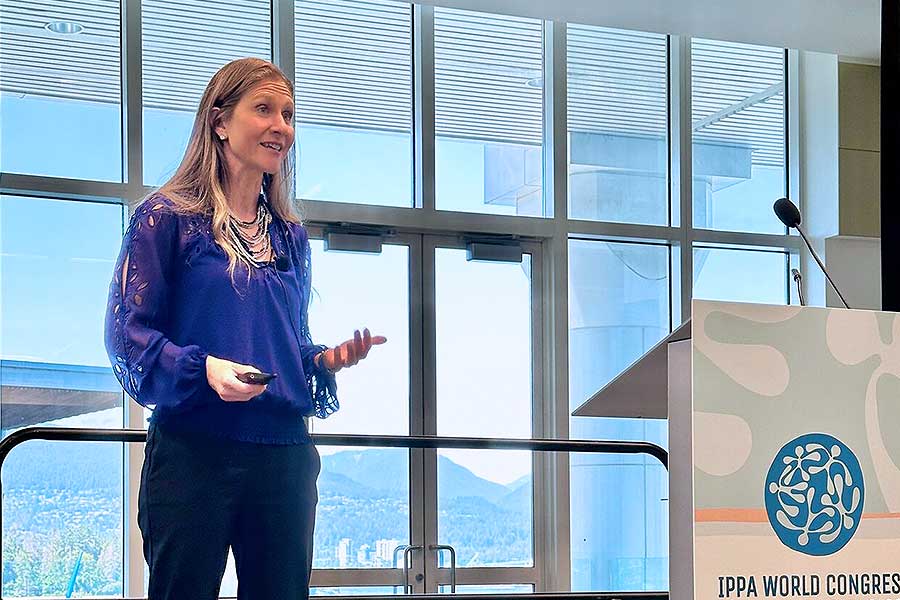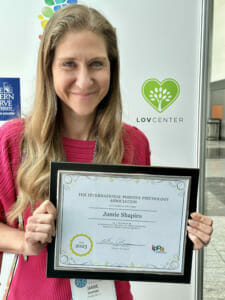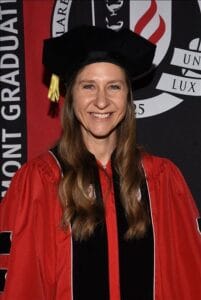A PhD in 3 Years and a Major Award: Now That’s What You Call Thriving

By virtually any measure, Jamie Shapiro is a professional success. She’s the founder and CEO of a leadership development firm, a bestselling author, public speaker, and recognized expert in the principles of positive psychology. She and her team at Connected EC work with C-Suite executives at Fortune 500 companies to help them thrive.
She recently added two more impressive credentials to her resume: PhD and internationally recognized researcher.
Two months after being hooded during commencement at Claremont Graduate University, Shapiro received the Exemplary Research to Practice Award at the International Positive Psychology Association’s World Congress in Vancouver, Canada. The honor was “an acknowledgment of the research I’ve done in bridging the gap between academia and the business world,” she said, as well as a significant milestone in her professional journey from the boardroom to the classroom and back.
For Shapiro, it was a virtual classroom—the only way she could attend CGU. Between her frequent travel to see clients and her personal life in Boulder, Colorado, there weren’t enough hours in the day to commute to campus weekly.
“I found Claremont a long time ago. I remember sitting with one of my colleagues and saying, ‘This is my school,’” Shapiro said. “If I’m coaching people to be better, it’s important that I’m constantly investing in getting better. … My clients lean on me for thought leadership.”
She reached out several times over the years to see if CGU could offer positive organizational psychology online, but it wasn’t an option. However, when the pandemic struck in early 2020, client visits were put on hold and much of the world locked down, so Shapiro called CGU again and spoke with then-Dean Michelle Bligh, who gave the answer Shapiro had long hoped for.
“The stars aligned. I knew I had this window, but I knew that there was a chance that at any moment CGU would go back to in-person full time, and I wouldn’t be able to finish the program,” Shapiro said. “That was a huge motivator for me to really focus on this moment. I knew if I could finish my coursework, I could do my dissertation from anywhere.”
In three years, Shapiro completed her master’s, her PhD, and her dissertation. (Being an expert in well-being, as well as a nutritionist, and having a supportive family certainly helped.)
As Professor Stewart Donaldson noted in his letter nominating her for the International Positive Psychology Association award, Shapiro took a fresh approach to how business leaders can remain effective despite the intense pressures they face.

bridging the gap between academia and the business world,” Jamie Shapiro says.
“Most of the articles and research on leadership focus on the general impact leaders have on followers and organizations or the mass exodus of top talent from corporate America due to burnout,” Donaldson said, but “insufficient attention has been devoted to the internal resources needed to sustain the positive effects of leadership. Understanding leader vitality—the physical, psychological, and emotional energy needed to deal with the demands leaders face every day—is paramount to the success of any leader working to build a positive culture, increase the bottom line, and help employees thrive.”
For her dissertation, Shapiro interviewed 20 CEOs of Fortune 1000 companies, focusing on leader vitality to understand what builds and drains it.
“I didn’t expect that I would find equal and opposite themes, meaning people talked about how they use their leadership vitality to create positive environments, but that when they were drained, they created negative environments. I found eight consistent themes that were equal and opposite, which was really interesting to me as a researcher. You don’t expect your data to fit so neatly into a construct like that.”
Shapiro said it’s a misconception that corporate leaders can maximize performance without caring for themselves as the foundation.
“We need to realize that leadership is a full-body experience, and we need to care for the whole human. By focusing on helping leaders thrive, helping them build cohesive teams, we can help them impact their organizations positively.”
Though Shapiro did not get to campus often during her studies, she wasn’t about to miss out on commencement.

“My whole family flew out: my kids, my husband, my parents, my uncle, my brother. I remember getting to the stage and feeling just so much emotion—a lot of tears and a lot of gratitude. I’m really so thankful to get to do this at a university with some really amazing colleagues.”
Shapiro showed her gratitude shortly afterward with a generous philanthropic investment in CGU’s Leader and Organization Vitality Lab, which supports student research into vitality, well-being, and optimal functioning. The LOV Lab also collaborates with Connected EC’s Leader and Organization Vitality Center on a wide range of applied research and evaluation projects, giving students valuable exposure to the corporate world.
“CGU is at the center of positive organizational psychology, and I think that should be screamed from the rooftops,” Shapiro said. “I hope that the LOV Center and the LOV Lab contribute to students wanting to come here.”